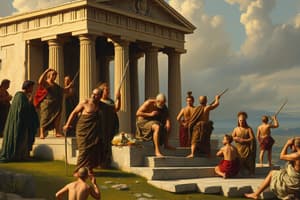Podcast
Questions and Answers
What was the primary function of marriage in ancient Athens?
What was the primary function of marriage in ancient Athens?
- Economic alliance between families
- Political power consolidation
- Religious obligation
- Procreation and birth of sons (correct)
In ancient Athens, women had significant roles in political affairs.
In ancient Athens, women had significant roles in political affairs.
False (B)
What was the role of a man in the household (oikos) of ancient Athens?
What was the role of a man in the household (oikos) of ancient Athens?
The man was the head of the family, responsible for protection, well-being, providing food and clothing, and making household decisions.
In ancient Athens, the group of enslaved people were referred to as ______.
In ancient Athens, the group of enslaved people were referred to as ______.
Match the following social statuses with their descriptions:
Match the following social statuses with their descriptions:
Which of the following describes the status of women in Sparta compared to Athens?
Which of the following describes the status of women in Sparta compared to Athens?
Divorce was prohibited in ancient Athens.
Divorce was prohibited in ancient Athens.
What was the approximate number of citizens in Athens around 430 BC?
What was the approximate number of citizens in Athens around 430 BC?
Welches soziale Status hatte in Athen die niedrigste Stellung?
Welches soziale Status hatte in Athen die niedrigste Stellung?
In Sparta hatten Frauen die gleichen politischen Rechte wie Männer.
In Sparta hatten Frauen die gleichen politischen Rechte wie Männer.
Was war die hauptsächliche Verantwortung des Mannes im Haushalt (oikos)?
Was war die hauptsächliche Verantwortung des Mannes im Haushalt (oikos)?
Die Bürger Athens um 430 v. Chr. waren ungefähr _______ Männer.
Die Bürger Athens um 430 v. Chr. waren ungefähr _______ Männer.
Ordne die folgenden sozialen Status mit ihren Beschreibungen zu:
Ordne die folgenden sozialen Status mit ihren Beschreibungen zu:
Welche Rolle spielte die Ehe in der athenischen Gesellschaft überwiegend?
Welche Rolle spielte die Ehe in der athenischen Gesellschaft überwiegend?
Sklaven konnten in Athen ihr Eigentum besitzen.
Sklaven konnten in Athen ihr Eigentum besitzen.
Was entschied der Mann im Haushalt bezüglich der Familie?
Was entschied der Mann im Haushalt bezüglich der Familie?
Flashcards
Social History
Social History
The study of how social groups or classes have lived in the past.
Athenian Social Strata
Athenian Social Strata
Different levels of society in ancient Athens, including free citizens, slaves, and foreigners.
Athenian Citizen
Athenian Citizen
A full member of Athenian society with rights and responsibilities.
Athenian Slave
Athenian Slave
Signup and view all the flashcards
Oikos
Oikos
Signup and view all the flashcards
Role of Athenian Men
Role of Athenian Men
Signup and view all the flashcards
Role of Athenian Women
Role of Athenian Women
Signup and view all the flashcards
Ancient Athenian Marriage
Ancient Athenian Marriage
Signup and view all the flashcards
Sozialgeschichte
Sozialgeschichte
Signup and view all the flashcards
Athenische Gesellschaft
Athenische Gesellschaft
Signup and view all the flashcards
Athenischer Bürger
Athenischer Bürger
Signup and view all the flashcards
Athenischer Sklave
Athenischer Sklave
Signup and view all the flashcards
Athenisches Oikos
Athenisches Oikos
Signup and view all the flashcards
Rolle der Frauen in Athen
Rolle der Frauen in Athen
Signup and view all the flashcards
Athenische Ehe
Athenische Ehe
Signup and view all the flashcards
Rolle der Spartanischen Frauen
Rolle der Spartanischen Frauen
Signup and view all the flashcards
Study Notes
Social History of Ancient Greece
- Social classes in Ancient Greece varied based on gender and affiliation.
- Citizens (free men) held higher social standing.
- Women and slaves were of a lower status, without equal rights.
- Slaves had no rights, whereas women were bound to the household.
Social Structure in Athens
- Free citizens held various social rights and responsibilities.
- Citizens with extended stay were called "Metöken".
- Slaves (and their different categories) had limited rights.
- Women were largely excluded from public life.
Sparta's Social Structure
- Spartan society prioritized military strength over other aspects.
- Citizens (Spartiates) had exclusive rights and responsibilities.
- Slaves (Helots) were more numerous than Spartiates.
- Women in Sparta held more autonomy, in contrast to Athens.
Marriage and Family in Ancient Greece
- Marriage primarily focused on procreation in Athens, often arranged.
- Women had limited rights and responsibilities.
- The male head of household had extensive control.
- Sparta’s family values were more centered around the state.
- Women in Sparta enjoyed more autonomy relative to Athenian women.
Population Figures (circa 430 BC)
- Athens: ~150,000 people (including families of citizens)
- ~110,000 slaves
- Sparta: ~200,000 people (Helots, Spartiates, Periöki)
- ~60,000 Periöki
Studying That Suits You
Use AI to generate personalized quizzes and flashcards to suit your learning preferences.
Description
Explore the complex social structures of Ancient Greece, including the roles of citizens, women, and slaves in both Athens and Sparta. This quiz delves into how social classes varied by gender and the distinct societal norms that governed relationships and rights. Test your knowledge of the social dynamics that shaped one of history's most influential civilizations.




